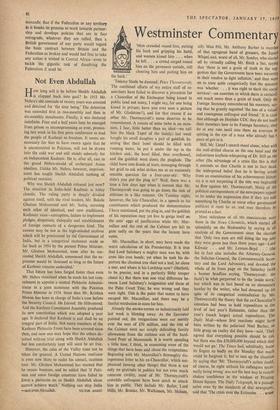Not Even Abdullah
How long will it be before Sheikh Abdullah is clapped back into gaol? In 1953 Mr. Nehru's old comrade of twenty years was arrested and detained for 'the time being.' The detention was extended first in two-monthly and then in six-monthly instalments. Finally, it was declared indefinite. Four and a half years later he emerged from prison as uncompromising as ever, promis- ing last week in his first press conference to lead the people of Kashmir to. freedom. It seems un- necessary for him to have sworn again that he is uncommitted to Pakistan, will not be drawn into the cold war and still stands solemnly for an independent Kashmir. He is, after all, cast in the grand Nehru-mould of archetypal Asian idealism. Unlike Mr. Nehru, however, imprison- ment has taught Sheikh Abdullah nothing of political restraint.
Why was Sheikh Abdullah released just now? The situation in India-held Kashmir is today chaotic. The ruling party is deeply divided against itself, with the rival leaders, Mr. Bakshi Ghulam Mohammed and Mr. Sadiq, accusing each other of identical, and now traditional, Kashmiri vices—corruption, failure to implement pledges, despotism, disloyalty and establishment of foreign contacts of a dangerous kind. The answer may be not in the high-minded motives which will be proclaimed by the Government of India, but in a categorical statement made as far back as 1954 by the present Prime Minister. Mr. Ghulam Mohammed, soon after he suc- ceeded Sheikh Abdullah, announced that the ex- premier would be 'detained as long as the future of Kashmir remains undecided.'
That future has been forged faster than even Mr. Nehru visualised when he made his last com- mitment to appoint a neutral Plebiscite Adminis- trator in a joint statement with the Pakistan Prime Minister in 1954. Since then Mr. Krishna Menon has been in charge of India's case before the Security Council. He fainted. He filibustered. And the Kashmir Constituent Assembly produced its new constitution which was adopted a year ago. It declared that Kashmir is and shall be an integral part of India. Not many members of the Kashmir Plebiscite Front have been arrested since then, and now one may hope that the others de- tained without trial along with Sheikh Abdullah but less comfortably kept will soon be set free.
However, the calm of the Valley must not be taken for granted. A United Nations mediator is even now there to make his annual, cautious tour. Mr. Ghulam Mohammed has warned that he means business, and he added that `if Paki- stan and some foreign countries have failed to force a plebiscite on us Sheikh Abdullah alone cannot achieve much.' Nothing can stop India






























 Previous page
Previous page